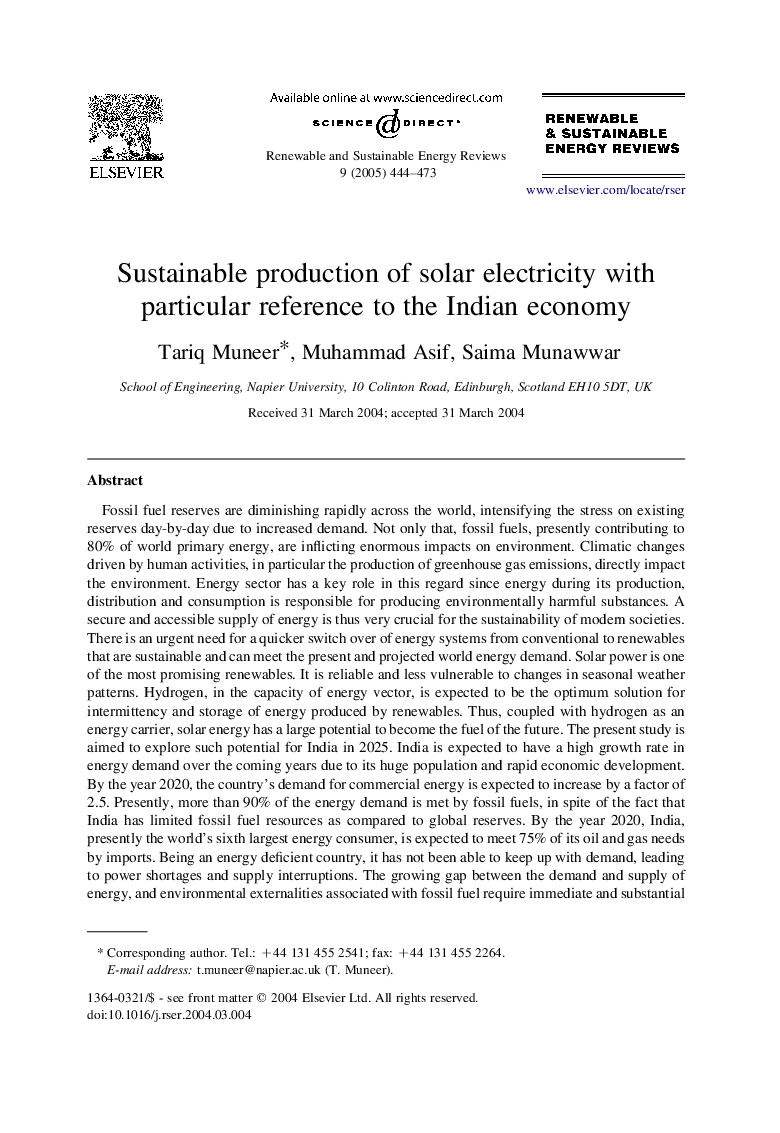| Article ID | Journal | Published Year | Pages | File Type |
|---|---|---|---|---|
| 10690107 | Renewable and Sustainable Energy Reviews | 2005 | 30 Pages |
Abstract
Fossil fuel reserves are diminishing rapidly across the world, intensifying the stress on existing reserves day-by-day due to increased demand. Not only that, fossil fuels, presently contributing to 80% of world primary energy, are inflicting enormous impacts on environment. Climatic changes driven by human activities, in particular the production of greenhouse gas emissions, directly impact the environment. Energy sector has a key role in this regard since energy during its production, distribution and consumption is responsible for producing environmentally harmful substances. A secure and accessible supply of energy is thus very crucial for the sustainability of modern societies. There is an urgent need for a quicker switch over of energy systems from conventional to renewables that are sustainable and can meet the present and projected world energy demand. Solar power is one of the most promising renewables. It is reliable and less vulnerable to changes in seasonal weather patterns. Hydrogen, in the capacity of energy vector, is expected to be the optimum solution for intermittency and storage of energy produced by renewables. Thus, coupled with hydrogen as an energy carrier, solar energy has a large potential to become the fuel of the future. The present study is aimed to explore such potential for India in 2025. India is expected to have a high growth rate in energy demand over the coming years due to its huge population and rapid economic development. By the year 2020, the country's demand for commercial energy is expected to increase by a factor of 2.5. Presently, more than 90% of the energy demand is met by fossil fuels, in spite of the fact that India has limited fossil fuel resources as compared to global reserves. By the year 2020, India, presently the world's sixth largest energy consumer, is expected to meet 75% of its oil and gas needs by imports. Being an energy deficient country, it has not been able to keep up with demand, leading to power shortages and supply interruptions. The growing gap between the demand and supply of energy, and environmental externalities associated with fossil fuel require immediate and substantial increases in electric power generation and transmission capacities, and exploitation of new avenues of energy supply that are more stable and environment friendly. The geographic location of India makes it a strong candidate for harnessing solar energy. Thus, solar PV is a potential technology to meet India's future energy demand and its associated environmental challenges. The present work proposes solar hydrogen based energy network to meet the future energy demand for the major cities of India in a sustainable way. In the proposed energy network, solar PV produced electricity is to be utilized to meet the energy demand during day hours. The solar generated electricity that is excessive of demand is to be stored in the form of hydrogen to be utilized during nocturnal hours and prolonged overcast conditions. A modular approach has been adopted for the purposed energy network to meet the year 2025 demand of six major cities of India: Chennai, Delhi, Jodhpur, Kolkata, Mumbai and Trivandrum. Present as well as projected cost scenarios for 2025 have been provided for all the proposed technologies to evaluate the economical viability of the energy network under study. Based on the futuristic trends, it is foreseen that by the year 2025, the PV electricity would be more economical than the fossil fuel electricity.
Related Topics
Physical Sciences and Engineering
Energy
Renewable Energy, Sustainability and the Environment
Authors
Tariq Muneer, Muhammad Asif, Saima Munawwar,
